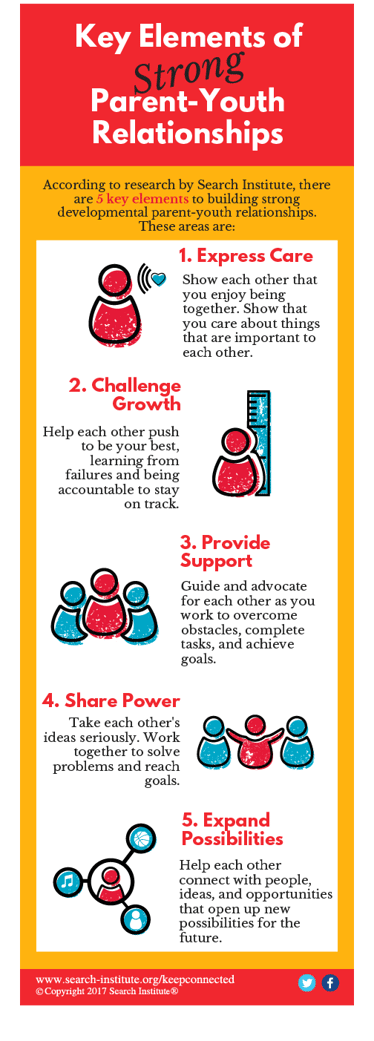Subscribe for Updates
Transitions to high school or middle school and high school are times of big change–both for parents and students. With new opportunities and and challenges come new worries and stresses.
And it’s an easy time for parents and youth to grow disconnected as outside demands, expectations, and shifts in their relationships pull them apart.
But keeping the relationship strong between parents and youth is essential at this age. Young people who experience strong relationships with their parenting adults are more likely to report a wide range of social and emotional strengths and other indicators of thriving.
Kids still value the parent’s involvement in their life as they transition to middle school or high school, but in different ways, as the relationships evolve.
But how to stay connected to kids and keep the relationship strong has been a challenge for both parents and youth.
Developmental Relationships
Search Institute has created a framework based on data collected from focus groups with youth, parents, educators, youth workers and others, surveys with parents and their children, as well as analysis of data from more than 5 million youth through Developmental Assets® surveys. We call that framework developmental relationships.
Most of us know that relationships are important; but we have been able to determine which elements of the relationship make it a developmental relationship— one that contributes to learning, growing and thriving.
Developmental relationships involve a dynamic mix of these five relational commitments:
Express Care: Show each other that you enjoy being together.
Challenge Growth: Help each other push to be your best, learning from failures and being accountable to stay on track.
Provide Support: Guide and advocate for each other as you work to overcome obstacles, complete tasks and achieve goals.
Share Power: Take each other’s ideas seriously. Work together to solve problems and reach goals.
Expand Possibilities: Help each other connect with people, ideas and opportunities that open up new possibilities for the future.
Why These 5 Elements Matter
Our research has shown that these five elements can make a big difference in parent-youth relationships. They are especially important when going through transitions, such as starting a new school or entering into the teenage years.
We know from research that when kids experience these five elements with parenting adults, they develop attitudes and skills that will help them throughout their lives. They also become more resilient, helping them overcome challenges they face.
In the weeks ahead, we’ll dive a little deeper in each of these five elements, and talk about how parenting adults can use them.
Until then, click on the infographic below to download it!
Click the image for a free download of the Developmental Relationships Infographic
Sources: Relationships First: Creating Connection that Help Young People Thrive, Search Institute, 2017, Don’t Forget the Families, Search Institute, 2015
Search Institute
3001 Broadway Street NE #310
Minneapolis, MN 55413
© 2021 Search Institute |
Search Institute is a 501(c)(3) nonprofit charitable corporation. All contributions are tax deductible.
